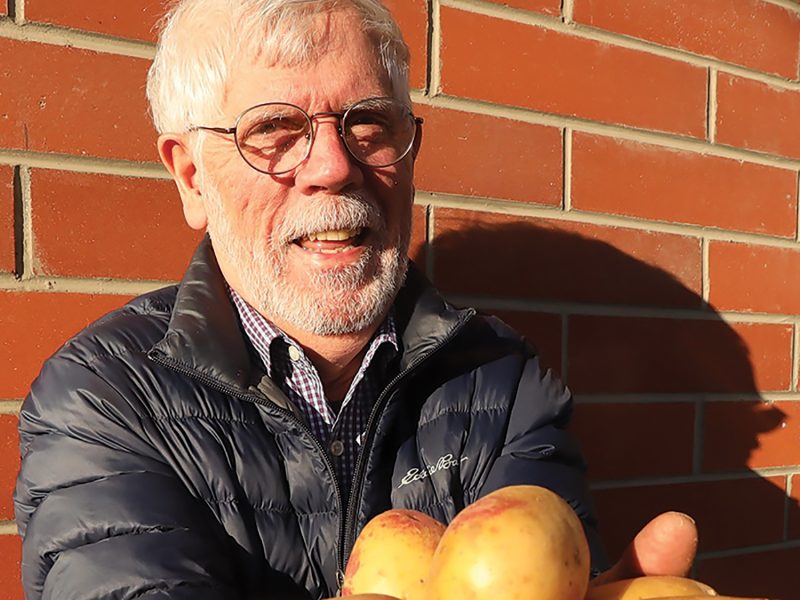100 MILE HOUSE – A co-op farmer near 100 Mile House is seeing renewed interest in the Cariboo potato nearly 50 years after it was outlawed as a commercial seed spud.
Rob Diether, a member of the Community Enhancement and Economic Development Society (CEEDS), has been growing the hardy yellow potato with pink eyes at the Horse Lake Community Co-Op since 1983 after he and a few others got their hands on the outlawed spud.
“We just kept growing them and producing and saving more and more seed,” Diether says. “We don’t grow a lot but it’s perfect for the Cariboo climate and over the years the farm co-op has grown several tons of the tuber. They are wonderful; a kind of creamy potato with slightly yellow flesh.”
The potato was a product of the potato breeding program at Agriculture and Agri-Food Canada’s Fredericton research station. It was tested in the Cariboo seed control area between McLeese Lake and Williams Lake in the 1960s and did extremely well, Diether says, earning itself the Cariboo name by an federal researcher in Prince George.
But by 1976, the Cariboo was deregistered as a commercial seed variety because its tubers clung to the vines, which included thick, feathery foliage.
“It was not a viable variety for commercial purposes because the plants were known to get caught up in the harvesting machinery,” according to the Canadian Food Inspection Agency (CFIA).
Decertification came with the threat of a $10,000 fine for those who flouted the law. Although no fines have been issued at this point, the CFIA acknowledges that it’s a possibility if the decertified potatoes are sold for seed.
“Since the Cariboo (potato) was deregistered in 1976, it is currently an unregistered variety and its continued production (depending on the size of the field) and sale of seed could result in the CFIA having to take steps to enforce the Seed Act and Regulations which may include fines,” the CFIA said in an email to Country Life in BC.
AAFC controls what seed varieties can be grown in the country to ensure all seeds are certified for disease resistance, insects and other issues. CFIA says commercial growers can still register a variety with CFIA or under the CFIA’s Garden Variety Program. Home growers can also apply to have the Cariboo added to the list of approved garden varieties.
Bill Zylmans, who sits on the BC Vegetable and Potato Association and BC Certified Seed Potatoes Growers Association in Delta, says Diether isn’t a problem, partly because his farm is far from commercial growers and partly because the Cariboo potato never saw a hugely productive yield.
“He isn’t a threat to the industry,” Zylmans says. “There are more of these kinds of varieties. It only comes into play if he turns it around and calls it a seed potato. This man is just having his fun, doing his thing way out there.”
If anything, Diether has reminded the public about the potato’s versatility – and why it deserves to be on the dinner plate.
Diether was inundated with calls and emails from people across the country looking for the outlawed tuber after he told CBC how he and some friends went in search of the Cariboo potato in the early 1980s.
It took them three years to get four Cariboo potatoes, which they mostly used for seed in the co-op garden.
“I don’t know what it is about potatoes. People are really interested,” Diether says.
Zylmans was at a potato conference in Toronto when the story came out, and says he was confronted by people asking him about the “rabble-rousers in BC.”
“It’s made a lot of people think,” Zylmans says. “Potatoes are a very diverse product that gives you a good balance of vitamins and minerals. There isn’t a vegetable out there that has as many uses as the potato.”
Diether, who shares Zylmans’ love of the potato, says he has no plans to stop growing the Cariboo variety even though it has other issues besides commercial harvesting. It must be hilled as much as possible and kept in a cold, dark space, he says, as it is light sensitive and turns green easily.
But he believes it’s important to have a diversity of potatoes and the Cariboo is perfect for the home garden.
“You can reach down and loosen up the soil and when you pull up the plant, the tubers are all connected to the vine,” Diether says. Plus, he adds, “It’s BC and it’s got the name Cariboo. There’s no such thing as a Cariboo carrot that I’m aware of.”


 Grapegrowers discuss freeze event
Grapegrowers discuss freeze event